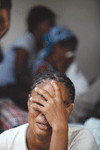PORT-AU-PRINCE – Troops and planeloads of food and medicine trickled in to Haiti on Thursday to aid a traumatized nation still rattled by aftershocks from the catastrophic earthquake that flattened homes and government buildings and buried countless people.

|
|
A Haitian reacts after an earthquake in Port-au-Prince January 13, 2010. The death toll in Haiti’s catastrophic earthquake could run to tens of thousands, the country’s president said on Wednesday, a day after the quake demolished schools, hospitals, houses and hillside shanties across the crowded and impoverished capital. RETERS/Eduardo Munoz |
Heavy aircraft had begun to ferry in aid but the influx had yet to reach shell-shocked Haitians who silently wandered the broken streets of Port-au-Prince, searching desperately for water, food and medical help.
“Money is worth nothing right now, water is the currency,” one foreign aid-worker told Reuters.
Looters swarmed a destroyed supermarket in the Delmas area of Port-au-Prince, peacefully carrying out electronics and bags of rice. Others siphoned gasoline from a wrecked tanker.
“All the policemen are busy rescuing and burying their own families,” said tile factory owner Manuel Deheusch. “They don’t have the time to patrol the streets.”
The United States was sending 3,500 soldiers and 300 medical personnel to help with disaster relief and security in the devastated Caribbean capital, with the first of those scheduled to arrive on Thursday. The Pentagon was also sending an aircraft carrier and three amphibious ships, including one that can carry up to 2,000 Marines.
“To the people of Haiti, we say clearly and with conviction, you will not be forgotten. In this, your hour of greatest need, America stands with you. The world stands with you,” President Barack Obama said.
The United States pledged long-term U.S. help for the crippled Haitian government. Parliament, the national palace, and many government buildings collapsed and it was unclear how many lawmakers and officials survived. The main prison also fell, allowing dangerous criminals to escape.
“The authorities that existed before the earthquake are not able to fully function. We’re going to try to support them as they re-establish authority,” U.S. Secretary of State Hillary Clinton told CNN.
There were still no signs of organized rescue operations to free those trapped in debris, and doctors in Haiti, the poorest country in the Western Hemisphere, were ill-equipped to treat the injured.
Survivors feared returning to their precarious homes and slept overnight in open areas where groups of women sang religious songs in the dark and prayed for the dead.
“They want God to help them. We all do,” said Hotel Villa Creole employee Dermene Duma, who lost four relatives.
Foreigners slept around the hotel’s pool while scores of injured and dying people lay outside. Sobs and wailing were heard throughout the night but aftershocks interrupted the mourning, sending panicked people running away from the walls.
The quake’s epicenter was only 10 miles from Port-au-Prince, a sprawling and densely packed city of four million people in a nation dogged by poverty, catastrophic natural disasters and political instability.
Bodies lay all around the hilly city. Corpses were delivered by the pickup truck load to the General Hospital in Port-au-Prince, where hospital director Guy LaRoche estimated the bodies piled outside the morgue numbered 1,500.
The Haitian Red Cross had run out of body bags and the International Committee of the Red Cross said 3,000 were on the way. Brazil, whose troops make up part of the UN peacekeeping force, proposed an emergency plan to set up a new cemetery and the United States was sending mortuary teams.
Haitians clawed at chunks of concrete with bare hands and sledgehammers, trying to free those buried alive.
A 35-year-old Estonian, Tarmo Joveer, was freed from the rubble of the United Nations’ five-story headquarters early Thursday, and told journalists he was fine.
The UN said at least 22 members of its 9,000-strong peacekeeping mission had been killed and scores were still missing. Brazil said 14 of its soldiers were among the dead.
Nations around the world pitched in to help. French Foreign Minister Bernard Kouchner said three French state aircraft carrying 40 tons of equipment, doctors and security staff had already landed in Haiti and two more were on the way.
The United States, China, and European states were sending reconnaissance and rescue teams, some with search dogs and heavy equipment, while other governments and aid groups sent tents, water purification units, food and telecoms teams.
Aid distribution was hampered because roads were still blocked by rubble and normal communications were cut off.
U.N. peacekeepers around the city seemed overwhelmed by the enormity of the recovery task ahead.
“We just don’t know what to do,” a Chilean peacekeeper said. “You can see how terrible the damage is. We have not been able to get into all the areas.”
Many hospitals were too badly damaged to use, and doctors struggled to treat crushed limbs, head wounds and broken bones at makeshift facilities where medical supplies were scarce.
Aid group Doctors Without Borders was sending an inflatable hospital with two operating theaters and the Brazilian military was sending two field hospitals. The U.S. Navy hospital ship Comfort was on the way back to Haiti, where it delivered medical care after a spate of storms caused massive flooding and mudslides in 2008.
-Reuters






Leave a Reply